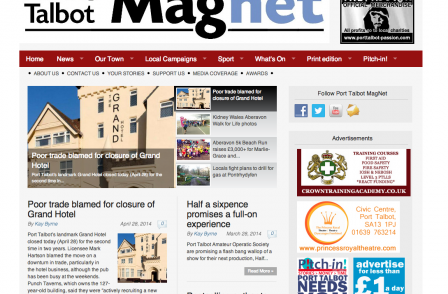
The traditional business model for local news is increasingly unviable. Research conducted by the Press Gazette which found that more than 240 local newspapers closed between 2005 and the end of 2011 is testament to this.
At the end of 2013 Trinity Mirror closed the Liverpool Post, and earlier this month it announced that the Fulham and Hammersmith Chronicle, which has a free weekly circulation of over 45,000, will close.
The significant decline in newspaper advertising revenue also looks set to continue, with almost £400 million forecast to be lost from the UK market by the end of this year alone.
But why is this a problem? Well, although the way we consume local news may have changed, the value of local news hasn’t.
Local news connects our communities, informs us about our community, supports citizens’ concerns and, when reported well, holds those with powerful interests to account. With the loss of local newspapers therefore come concerns about democracy, transparency and accountability.
Local news websites have carved out a vital role in filling news gaps across the UK and Ireland, with more than 400 of such sites producing more than 2,500 stories a week. But the geographical coverage of these local news websites is inconsistent, and without support, their long-term sustainability remains a challenge.
That is not to say that the UK local news market is entirely without support. UK Government and charitable support for local newspapers [via advertising], BBC radio stations and local TV is worth more than £250 million per annum. But there is no large-scale media-neutral fund available to support grassroots organisations with small pots of funding.
At the Carnegie UK Trust, our own work with local news organisations attracted almost 80 applications for support for only five awards, suggesting that there is significant demand for such funding.
Although at an early stage, our work with grassroots news organisations in Brixton, Alston, Port Talbot, Wester Hailes and Harlow has already provided some insight into the importance of local news organisations to their communities and how local news might be delivered in the future.
Local, grassroots news organisations often deliver a significant range of community news and information, in return for quite a low level of investment.
For example, in just four months the project in Harlow alone published 850 stories and 90 videos. This suggests that the local community news sector has capacity to deliver projects that can deliver a high level of output in a short period of time, and can provide good value for money for both citizens and funders.
Local news is of course a vital tool of community action and cohesion.
To date, the organisations we have been working with have featured stories on a range of issues that matter to their communities, such as poor street lighting, library closures and the local impact of benefit cuts. And they have often done so in new and locally innovative ways.
For example, the project in Wester Hailes held a chat with local police and fire services on Twitter, asking a range of questions on topics from knife crime to noisy neighbours to the number of police officers on their streets.
These experiences raise questions about the support available for local news organisations and how fit for purpose current funding mechanisms are for the 21st century local news market.
There is currently only limited support for local news projects from large foundations, charities and grant makers who are interested in the wellbeing of communities and individuals.
Traditionally, commercial advertising revenues have played a vital role in sustaining the ‘public good’ of high quality news content. But as these revenues become ever more difficult to source, is there now a role for other funders to help support local news, given its significant social and economic value for communities?
The success of the organisations we are working with in improving the quantity and quality of local news on the web also suggests that there is an opportunity to re-evaluate existing government interventions into the local news market which exclude web-based providers.
It is time to consider if support mechanisms such as the Community Radio Fund could be expanded to provide opportunities for local news providers who work on different platforms, such as the web, which have much lower entry costs.
Likewise, we could be exploring if there is scope to amend the regulations on which news outlets are awarded the contracts to advertise statutory notices, such as traffic and planning orders, to identify if there are opportunities here to support high quality, independent web-based news providers, as well as the printed press.
These are just a few of the questions for discussion which will shape the future provision and sustainability of local news. The indisputable evidence of the importance of local news to supporting our democracy and connecting people and place means that the time is now for policymakers and practitioners to invest in new and improved neighbourhood news.
Lauren Pennycook is Policy Officer at the Carnegie UK Trust
Email pged@pressgazette.co.uk to point out mistakes, provide story tips or send in a letter for publication on our "Letters Page" blog
